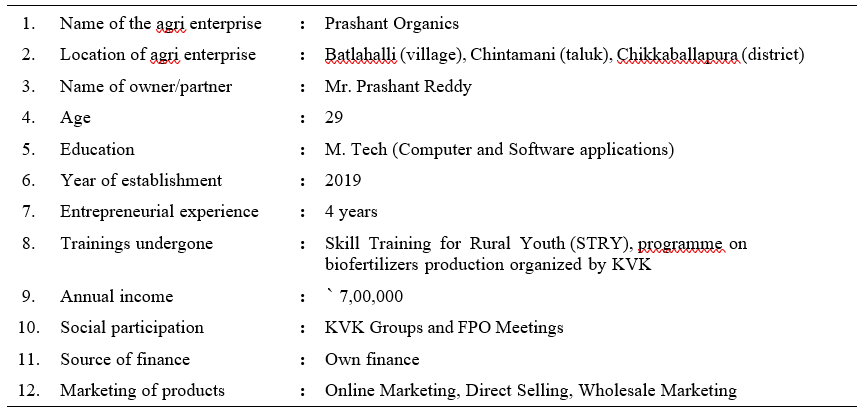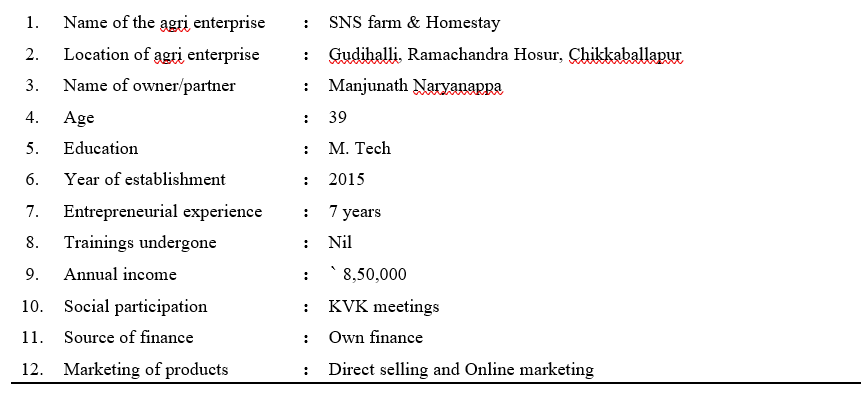Case Studies of Agripreneurs in Karnataka-Prospects and Challenges
0 Views
AKSHITHA*, P. GANESH KUMAR, T. LAKSHMI AND B. SANDHYA RANI
Department of Agricultural Extension, S.V. Agricultural College, ANGRAU, Tirupati-517 502.
ABSTRACT
The present study was conducted in two districts of Karnataka viz., Chikkaballapur and Kolar districts. The study aimed to
investigate the key facts, and figures of successful agripreneurs. Case study method which is a comprehensive study of a social unit comprised of a person, a group, a social institution, a district, or a community was followed to study the selected cases of suc- cessful agripreneurs. Case analysis of the successful agripreneurs will help to derive lessons and insights from particular cases. This would in turn help in capacity building of the agripreneurs by enabling them in better leveraging their strengths. The study will also motivate young graduates and other farmers to come forward and adopt such activities taken up by the agripreneurs..
KEYWORDS: Agripreneurs, Agrientrepreneurship, Innovations.
INTRODUCTION
In the last two years, the agriculture industry has seen remarkable expansion. The industry, which is the largest employer of workforce, accounted for 18.8 per cent of the country’s Gross Value Added (GVA) in 2021-22, with a growth of 3.6 per cent in 2020-21 and 3.9 per cent in 2021-22. Over the last five years, the livestock sector has grown at an annual rate of 8.15 per cent. It has been a consistent source of revenue for agriculture households, contributing to around 15 per cent of their average monthly income. The green revolution transformed India from a food grain deficient country to a surplus food grain producer. In a span of three decades, India became a net exporter of food grains. Besides providing food security, agriculture has been an important source of raw material for the industry due to which the demand on agriculture sector has been increasing rapidly. Therefore, to meet such demand, agriculture all over the world is going through a phase of transition.
In India,agriculture is view edasa traditional occupation and way of life. The concept of ‘Agrientrepreneurship’ is still in its early stage in the agrarian economy, with few players, which makes it difficult to exploit the opportunities available within agriculture sector. As a result, it become vital to promote agrientrepreneurship in the country. A business-like approach to farming is necessary to equip farmers with better opportunities. Agri-entrepreneurs look for opportunities everywhere which make them more efficient which in turn has a great impact in the agriculture sector.
A shift from agriculture to agribusiness is an essential pathway to revitalize Indian agriculture and to make more economic and profitable venture. Agripreneurs have the potential to contribute to a range of social and economic development such as employment generation, income generation, poverty reduction and improvements in nutrition, health and overall food security. Agripreneurship has the ability to promote economic development by diversifying sources of income, providing widespread employment and entrepreneurial opportunities in rural areas. The entrepreneurship skills applied in the field of agriculture may yield positive results and a well-trained agripreneurs may become a role model. Hence, the present research aimed to identify the successful agripreneurs who can serve as a role model for the youth and other venturing farmers in the society.
MATERIALS AND METHODS
Case study method is a comprehensive study of a social unit comprised of a person, a group, a social institution, a district or a community (Young, 1996). It is the social microscope, as stated by Burgess (1993). A case study method was followed in the present study few successful cases of agripreneurs of Chikkaballapur and Kolar districts of Karnataka. The selected agripreneurs were personally inter-viewed and data was collected with the help of a semi-structured interview schedule and open end questions.
CASE STUDIES OF SUCCESSFUL AGRIPRENEURS
CASE STUDY 1
India is witnessing a transformation wherein qualified youngsters were leaving cushiony jobs and started farming in rural areas by adopting suitable technologies. This is what happened with 29 years old Mr. Prashant Reddy, S/o Ramesh Reddy who hails from Batlahalli village of Chintamani taluk, Chikkaballapura district of Karnataka state. Received the “Best Youth Agrientrepreneur award” for the year 2020 by the agriculture minister of Karnataka. After pursuing M. Tech, he joined a private firm in Bangalore and was getting a good salary. Looking into the increasing demand for organic fruits and vegetables in Bangalore, he explored the prospects of organic farming, he decided to quit his software job and started organic farming in his native village during 2019-20.
Contributing factors for the success
The agripreneur participated in the Skill Training for Rural Youth (STRY), Programme on biofertilizer production organized by KVK, Chintamani. This training served as push factor and with the guidance of Scientists of KVK, Chintamani, he was successful in getting a good yield. But due to the outbreak of COVID 19 and lockdown, marketing became the biggest challenge and he was unable to market his produce like all other
Table 1. Profile of agripreneur

farmers. With his software skills, he was able to develop simple software for marketing the produce and decided to sell the organically grown produce in the apartments of Bangalore City. Software link was shared on different ICT platforms like Whatsapp, Facebook, Instagram, emails etc., to create awareness about it. By clicking on the link, customers were able to get the information like importance of organic products, availability of organic fruits and vegetables available, their price and approximate date of delivery. Based on the customer order he used to supply the organic produce to the customers by maintaining social distance and following hygiene procedures, and was able to generate a net profit of around ` 7,00,000 annum.
Mr. Prashant is hard working and also a smart working young farmer. Looking into increased demand for organic produce from customers, he mobilized farmers growing organically from surrounding villages and started marketing in a collective approach on regular basis. Due to the mobilization of organic farmers, supply increased and further due to the perishability and bulkiness of produce, it became necessary to sell the produce in bulk quantities. Later he decided to sell his produce to Big Basket, Ninjacart, Spudnic farms, wholesale dealers and organic farmers associations in order to make profit. Initially, Mr. Prashant adopted mono cropping by just growing carrots and beetroot. Now after realizing the benefits of direct selling to consumers, he
adopted a staggered sowing method in order to supply all vegetables on a regular basis. Presently he is growing Beetroot, Carrot, Tomato, Green leafy vegetables, Papaya, Guava, Custard apple, Red gram, Sweet corn, Cabbage, Minor millets etc. With the aim of integrated farming, he has started animal husbandry, poultry, beekeeping and rearing fish in farm pond and utilizing resources efficiently towards sustainable farming.
Conclusion
With an increasing demand for organic products, most of the farmers started shifting towards organic farming and it is also important to meet the food needs of growing population. Integrated farming system plays a significant role in the effective management of available resources at the farm level by generating adequate income to the farmers and employment to rural people.
CASE STUDY 2
Profile
Many city inhabitants are curious about village living and farming. Manjunath Naryanappa is 39 years old software engineer, who owns 7 acres of farm at Gudihalli near Chikkaballapur. He started SNS farm and homestay which offers an authentic experience of living on the farm. Visitors from all over Karnataka, especially people from Bangalore, visit the farm to live within the natural blanket of the village. Manjunath is a data scientist working with a top IT company in Bangalore.
Contributing factors for the success
When he decided to pursue his passion and continue the family farming practice, he decided to apply the 5 Why’s technique from his work and apply it to farming. This led to a series of revelations about why farmers use chemicals in their farming, why do pests attack certain crops and avoid certain crops and does nature do certain things. This led him to start his journey to natural farming and turned to YouTube and adopted natural farming techniques into his farm. He converted his entire 7 acres of land into natural farming and initially he faced difficulty with low yields and couldn’t able to control pests and diseases. Later on, he learned to manage the resources available within the farm and turned them into inputs to control pests and diseases. He owns 7 goats, backyard poultry, 5 desi cows, and started preparing organic fertilizers using dung and urine from desi cows. He could also able to grow most of the vegetables such as Brinjal, Tomato, Cabbage, Beans, Pumpkin, Bottle guard, Chilies, Spinach, Bitter guard, Drumstick, etc., fruit crops such as Papaya (Red lady variety), Guava, Grapes, Sapota, Banana and Dragon Fruit. Thirty per cent of his land is covered with agroforestry and took him 5 years to build an organic farm. Today he has a thriving farm that he could able to run with his family in Chikkaballapur. Everybody from his brother to his wife and kids all helped him on the farm, he earned a net profit of 55,000/- per month by selling fruits, vegetables and desi milk and he earned around 10,000-15,000/-
Table 2. Profile of agripreneur

month by offering homestay. Initially, power cut was a big challenge since the farm was located outside the city. Later, he installed solar panels, and the generated electricity was used for the farm and home consumption. He sold organically grown vegetables to the visitors and also ties up with companies like Farmizen and EasyTaaza through which he sold organic fruits and vegetables, from which he could able to make additional profits.
Conclusion
He offers homestay for those who enjoy going to villages, while promoting healthy lifestyle choice and helping people to connect with nature. He has been hosting guests since 2017, he does extra efforts to make the experience of every guest a special one, especially children who enjoy nature while playing with calf and lambs with little innovative efforts he could able to conserve resources and generating revenue and inspiring youth to retain in farming.
CASE STUDY 3
Profile
Many farmers are quitting agriculture nowadays and moving to cities in search of better livelihood. Under these challenging circumstances, Mr. Chalapathi, is 39 years old Chartered Accountant, who hails from Kadudhevandahalli village of Srinivaspur taluk Kolar district of Karnataka, used his professional expertise to convert his fallow land into a dragon fruit farm. Since his childhood, he was passionate about agriculture.
Contributing factors for the success
Earlier he used to cultivate Finger millet during Kharif and for the rest of the seasons, the land was left fallow. So, he always wanted to add more value to farming and started looking at crops or fruits which could sustain the drought conditions and demanded less labour. Since Kolar is a drought prone district where rainwater is a major constraint. He heard about dragon fruit for the first time in 2018. His friend from Gujarat bought dragon fruit to his office, he liked the fruit very much and was very curious to know about it. He started researching where it is sold, from where it is imported and how it is produced. Participated in the training programmes conducted by KVK Kolar and Technical secession held by scientists of IIHR, Bangalore on dragon fruit cultivation.
After research, he came to know that there are hundreds of species, but in India, very few farmers cultivate them. Only two types of dragon fruit are grown in the area. Realizing the prospects of exotic fruit demand in India, he bought 500 dragon fruit plants from a farmer in Gujarat. In 2020 because of lockdown and restrictions he was working from home. In his free time, he used to visit the farm every day and take care of the plants along with his father. In the very first year, he got a good yield. After the fruit was harvested, the question arrived was where to sell it, and whom to sell it in the market. He went to the fruit shops with some fruits initially, and the shop owners were not ready to take them at all. But when he explained the demand for the fruit, they agreed to buy. He utilized the opportunity of lockdown while the import
Table 3. Profile of agripreneur

of fruits was restricted, and internal demand for healthier fruit was raised. By realizing this he sold the fruits to the companies like Big Basket, More and malls located around Kolar and Bangalore. Since the dragon fruit was new to the district, he was the first to cultivate it. Later he planted Avocado intercropped with Chrysanthemum and Onion which he bought from Coorg. They also kept 5 honey bee hive boxes which are essential to enhance pollination and cause better fruit setting. He sold the dragon fruit at ` 100-120 kg, even sometimes at ` 150 per kg and around 20 kg of fruit can be harvested from a single plant. He also had grown vegetables like Chilies, Drumsticks and Brinjal under rainfed. During the rainy season, he harvested rainwater and utilized it for the rest of the seasons. He availed the subsidy from the government of Karnataka under the Krishi Bhagya scheme to construct farm pond for rainwater harvest. Learning about his success, the Department of Horticulture has come forward to support him with subsidies and helped in marketing the fruit. They also created awareness among other farmers. Realizing the growing demand for dragon fruit at present Mr. Chalapathi and other dragon fruit farmers in the district are planning to form an association or a community to sell the dragon fruit, other exotic fruits and horticulture products under a single brand name.
He is an inspiration to many other farmers and young agri-allied entrepreneurs who may also take such initiatives. At present people visited to the orchard to enquire and learn the process of cultivation of the dragon fruits. Now Mr. Chalapathi is an agripreneurs, who works full-time in his field and planning to bring more innovations in his farm.
LITERATURE CITED
Divya, N and Karthikeyan, C. 2021. A case study of an organic Agripreneur adopting integrated farming system model at Kullagoundenpudur village of Erode district in Tamil Nadu, India. Journal of Applied and Natural Science. 13(SI): 162-166.
Geetha, M and Manjula, N. 2016. Entrepreneurship development among farm women through finger millet processing and value addition: A case study in Karnataka. International Journal of Home Science. 2(3): 07-11.
Pandey, G. 2013. Agripreneurship education and development: Need of the day. Asian Resonance. 2(4): 155-157.
Pavan, M.K., Yarzari, S.P., Devegowda, S.R and Kumari, K. 2019. Agripreneurship prospects and initiatives in India. Extension Education and Rural Development. 17(12): 117.
Young, D. 1996. Changing tastes and endogenous preferences: Some issues in modelling the demand for agricultural products. European Review of Agricultural Economics. 23(3): 281-300.
- Genetic Divergence Studies for Yield and Its Component Traits in Groundnut (Arachis Hypogaea L.)
- Correlation and Path Coefficient Analysis Among Early Clones Of Sugarcane (Saccharum Spp.)
- Character Association and Path Coefficient Analysis in Tomato (Solanum Lycopersicum L.)
- Survey on the Incidence of Sesame Leafhopper and Phyllody in Major Growing Districts of Southern Zone of Andhra Pradesh, India
- Effect of Organic Manures, Chemical and Biofertilizers on Potassium Use Efficiency in Groundnut
- A Study on Growth Pattern of Red Chilli in India and Andhra Pradesh

